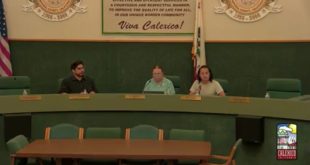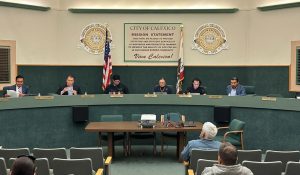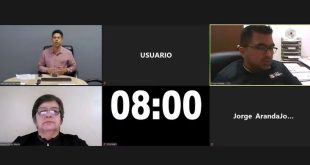In a contentious meeting on Feb. 21st, the Calexico City Council voted to accept a proposed Asylum Seekers and Migrant Assistance Plan, which will be funded by a $2,000,000 grant from the California Department of Social Services – Office of Equity. The decision, which passed by a narrow 3-2 margin, has sparked fears among members of the community that Calexico will become a magnet for asylum seekers and migrants, potentially putting the safety and quality of life of its citizens at risk.
Council members Camilo Garcia and Javier Moreno were the dissenting votes, vehemently opposing the plan.
Despite facing opposition residents, Mayor Gloria Romo and Council members Gilberto Manzanarez and Raul Urena stood firm in their decision to approve measures to address the asylum seeker border crisis. The trio argued that taking action was necessary to prevent the situation from escalating further. They emphasized that failing to act would only exacerbate the crisis, leading to increased numbers of asylum seekers and further strain on resources.
In 2020, Title 42 was implemented as a measure to curb the spread of diseases during the COVID-19 pandemic. By 2023, the removal of Title 42 revealed border communities, particularly Calexico, grappling with a substantial influx of asylum seekers.
State Senator Steve Padilla intervened, allocating $2 million through the California Department of Social Services to alleviate Calexico’s financial strain.
Despite the intended purpose of easing Calexico’s resources from the surge in asylum seekers, critics argue that the $2 million grant, directed towards Non-Governmental Organizations (NGOs), appears more as a temporary solution than a comprehensive strategy. The focus on non-profits facilitating onward travel raises concerns about the lack of a long-term sustainable relief plan.
According to Acting Fire Chief Eduardo Ainza, seven days a week, the port of entry attempts to release twenty-five asylum seekers at 10:00, 14:00, and 18:00 hours, for a total of approximately seventy-five migrants per day. Ninety percent of these migrants choose to utilize services provided by Catholic Charites and are transported to hotels in the Imperial Valley while they organize the details of the remainder of their travels. In addition to shelter, these services provide medical care, food, and transport to regional airports.
Those travelers that choose not to accept these services, either have prearranged travel plans, or cannot provide proof they are family and will therefore be subject to separation per Catholic Charity policies. Prearranged travel plans often require a layover in Calexico ranging from a few hours to a few days, families without documentation proving relation are often left with limited options during this layover period. The intention of this option is to avoid hardships or harm that may come to asylum seekers on the streets of Calexico.
“To date there have been no incidents generated by the fire department in response to the asylum seekers. The 911 system will continue to be the resource utilized for emergencies,” Ainza wrote in his report to the city council.
The staff report concludes stating that when the grant funds have been exhausted, this project will be terminated.
The City Council’s forthcoming plan details the initial scope of work for addressing homelessness in the community, with the understanding that adjustments may be necessary as the project unfolds. A request for proposal is expected to be issued, including a mandatory meeting with nonprofit organizations to discuss essential services. The plan encompasses various aspects such as hygiene measures, comfort provisions, food services, and security measures to minimize the burden on local law enforcement. Additionally, the plan considers the importance of coordinating with travel vendors and maintaining communication with the port of entry for traveler transport. The adaptable nature of the plan underscores its ability to meet evolving needs and challenges as it progresses.
Councilman Javier Moreno said this is a federal issue that the city should not get involved in and said the money should be used for public safety.
“We should be focusing on our budget. Why do we have to spend our energy on this? The San Diego migrant center is closing because they cannot sustain it and there is not enough money in the world to save it because we are not the federal government. They have unlimited money and resources. We don’t,” Moreno said and added he will contact Senator Steve Padilla to ask him why that money was allocated for the asylum center.
“As an elected official, I want answers,” Moreno said.
Councilman Manzanarez quickly rebutted Moreno’s argument saying that any funding given to the city should be used for what was allocated or they would get in trouble.
“As much as we would love to be El Centro and not have to deal with border town issues, the reality is that we have a border crisis. This is what comes with a border crisis,” Manzanarez said. “Should we allow them to roam the city? Should we allow them to become homeless? The federal government is the one causing this problem. They are dropping them into Calexico. They are the ones causing this problem and we expect them to fix it from the goodness of their hearts? Unfortunately, it is our problem now.”
Manzanarez added to the motion that the winning nonprofit provides monthly financial reports so there can be transparency. Councilman Camilo Garcia said that even with that money for first responders or law enforcement to address that issue. Garcia pointed out that one of the requirements is to provide security but that will mean calling the police.
“I appreciate the good effort but it’s time to give this money back so we can move on to the next task,” Garcia said. “This council didn’t ask for this. At least I didn’t. Esperanza, you said that you don’t have manpower and this is not the first time you have said it. So why are we going against the recommendation from the staff? We are putting ourselves in a hole that we will not be able to climb back up and we will be putting more string in our resources rather than offering any type of help,” Garcia said.






